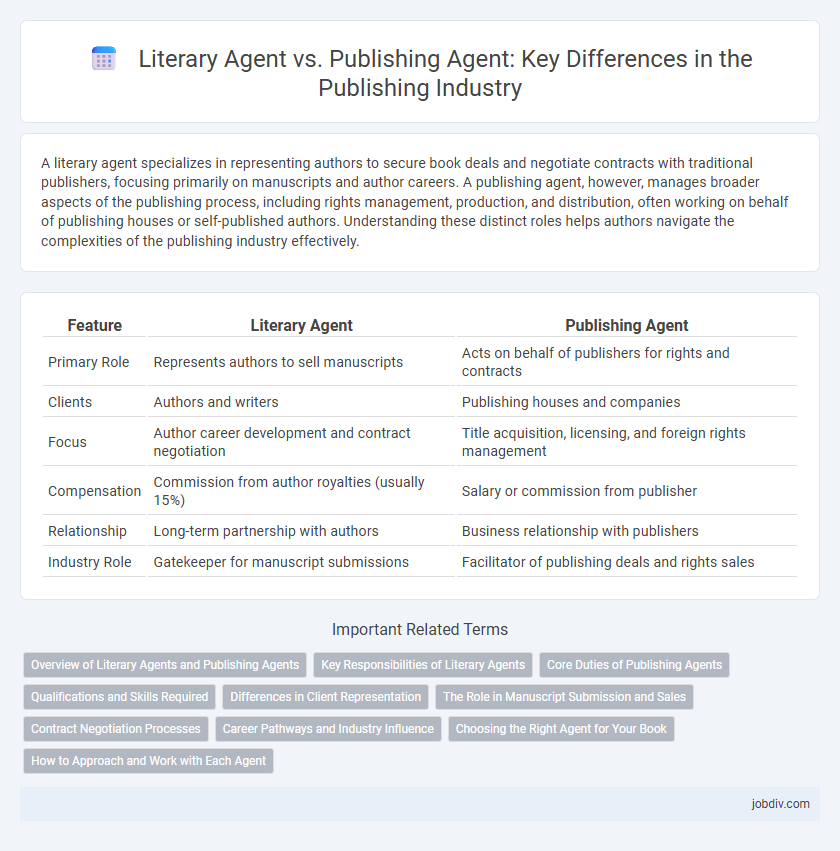A literary agent specializes in representing authors to secure book deals and negotiate contracts with traditional publishers, focusing primarily on manuscripts and author careers. A publishing agent, however, manages broader aspects of the publishing process, including rights management, production, and distribution, often working on behalf of publishing houses or self-published authors. Understanding these distinct roles helps authors navigate the complexities of the publishing industry effectively.
Table of Comparison
| Feature | Literary Agent | Publishing Agent |
|---|---|---|
| Primary Role | Represents authors to sell manuscripts | Acts on behalf of publishers for rights and contracts |
| Clients | Authors and writers | Publishing houses and companies |
| Focus | Author career development and contract negotiation | Title acquisition, licensing, and foreign rights management |
| Compensation | Commission from author royalties (usually 15%) | Salary or commission from publisher |
| Relationship | Long-term partnership with authors | Business relationship with publishers |
| Industry Role | Gatekeeper for manuscript submissions | Facilitator of publishing deals and rights sales |
Overview of Literary Agents and Publishing Agents
Literary agents represent authors, negotiating book deals and providing career guidance to secure publishing contracts with major houses. Publishing agents, in contrast, work within publishing companies to acquire manuscripts, manage editorial processes, and oversee production and distribution. Both roles are crucial in the book publishing ecosystem, but literary agents advocate for writers while publishing agents focus on content acquisition and book market strategy.
Key Responsibilities of Literary Agents
Literary agents primarily focus on representing authors, negotiating book deals, and securing publishing contracts by leveraging industry connections and market knowledge. They evaluate manuscripts, provide editorial guidance, and help authors navigate rights management, including foreign and subsidiary rights. Their key responsibility is to advocate for the author's interests and maximize the book's potential success in the competitive publishing landscape.
Core Duties of Publishing Agents
Publishing agents primarily manage the negotiation of contracts between authors and publishers, ensuring favorable terms and protecting the author's rights. They coordinate editorial, marketing, and distribution efforts to maximize a book's commercial success. Unlike literary agents who focus on author representation, publishing agents work within publishing houses to streamline production and sales processes.
Qualifications and Skills Required
Literary agents require strong negotiation skills, deep knowledge of the publishing industry, and the ability to scout promising manuscripts to connect authors with appropriate publishers. Publishing agents, on the other hand, must possess expertise in contract management, distribution channels, and market analysis to ensure successful book production and sales. Both roles demand excellent communication, industry insight, and a keen understanding of author needs and market trends.
Differences in Client Representation
Literary agents primarily represent authors, negotiating book deals and securing publishing contracts to maximize royalties and rights. Publishing agents, however, work directly with publishing houses, managing rights sales, marketing strategies, and distribution channels. The key difference lies in client focus: literary agents advocate for authors' creative and financial interests, while publishing agents facilitate the publisher's business operations and market reach.
The Role in Manuscript Submission and Sales
Literary agents primarily focus on representing authors during manuscript submission, negotiating publishing contracts, and securing book deals with publishers. Publishing agents handle rights management, including foreign sales, film adaptations, and subsidiary rights to maximize revenue streams for published works. Both agents play crucial roles in the sales process but target different stages and aspects of an author's career and intellectual property.
Contract Negotiation Processes
Literary agents specialize in contract negotiation by leveraging extensive industry knowledge to secure favorable terms for authors, including advances, royalties, and rights management. Publishing agents typically focus on facilitating deals between publishers and authors but may lack the depth in contract intricacies that literary agents provide. This distinction impacts the efficiency and outcome of contract negotiations, influencing an author's long-term career and revenue potential.
Career Pathways and Industry Influence
Literary agents primarily focus on representing authors and their manuscripts, guiding career pathways by negotiating book deals and securing publishing contracts with traditional publishers. Publishing agents concentrate on the acquisition and development of content for publishing houses, influencing industry trends through editorial input and market analysis. Both roles significantly shape the literary landscape, but literary agents directly impact author careers while publishing agents drive content curation and publishing strategies.
Choosing the Right Agent for Your Book
Selecting the right agent for your book hinges on understanding the distinct roles of a literary agent versus a publishing agent. Literary agents specialize in representing authors to secure book deals with publishers, negotiating contracts, and managing rights, while publishing agents often focus on the logistics of production and distribution within publishing houses. Authors should prioritize literary agents with proven track records in their genre and strong industry connections to maximize the book's market potential and authorial success.
How to Approach and Work with Each Agent
When approaching a literary agent, submit a polished query letter and a compelling manuscript sample tailored to their genre preferences, emphasizing your unique voice and market potential. In contrast, working with a publishing agent often involves direct negotiation of contracts and rights on behalf of published authors, requiring clear communication and a strong understanding of publishing agreements. Building professional relationships with both types of agents depends on respecting their roles--literary agents prioritize manuscript representation while publishing agents focus on business and rights management.
Literary Agent vs Publishing Agent Infographic

 jobdiv.com
jobdiv.com